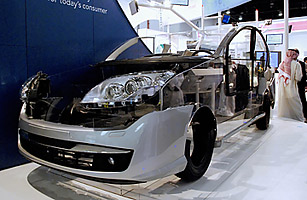
A car that works on solar energy is displayed at an exhibition during the World Future Energy Summit in Abu Dhabi.
You might think green entrepreneurs would be pretty gloomy right now. The global financial crisis has national budgets bleeding red and governments are sure to start tightening their belts over the coming few years — likely cutting back on investment in green projects. Then there's last month's failure to negotiate binding carbon emission cuts in Copenhagen, which caused the price of carbon to slump and has mainstream businesses grumbling about a lack of clarity on targets.
But if the thousands gathered in the Arabian Gulf city of Abu Dhabi this week for the annual World Future Energy Summit are anything to go by, the fast-growing green economy remains a rare bright spot in a world of troubles. The summit, which in just three years has become an obligatory date for anyone in the business of renewable energy, carbon capture or energy-smart technologies, attracted 9,000 people on its first day. Attendees listened to ministers and business leaders from around the globe talk about green energy and climate change and nosed around 600 stands —almost twice as many as last year — showcasing everything from solar panels to electric cars.
The feeling among many conference-goers can be summed up like this: the politicians might have failed to act on climate change, but everybody else is going to push on regardless. Take Bill Gross, founder of eSolar, a California-based firm that builds solar power plants that use mirrors to concentrate sunlight and boil water that then turns a turbine. Gross has just cut a deal with a privately-owned Chinese power equipment manufacturer to build, over the next 10 years, solar power plants that will generate 2 gigawatts of electricity. To put that in perspective, that's about four times more power than what's produced by all the solar power plants in the world right now. There's interest beyond China, too. After a lunchtime presentation, would-be buyers from the Middle East and Europe milled around to talk to Gross about possible projects, as well.
Then there's the Abu Dhabi-based company Enviromena, which developes photovoltaic solar cells and recently built a roof out of solar panels at the new Formula 1 racecar track just a few miles away. "We're a very small example of a much larger trend," says CEO Sami Khoreibi, who moved from his native Canada to the Gulf three years ago. Khoreibi is blunt about the reason he chose the region to set up a renewable energy firm: "The government here is investing in creating a hub."
Despite the downturn, the oil-rich states in the Gulf and fast-growing economies in Asia are likely to continue to invest in renewable energy. Western capitals such as Washington remain committed, too, pledging massive increases in green spending despite the looming budget squeeze. Corporate spending on developing green energy sources and making existing plants and buildings more efficient is also going up. Total investment in clean energy may have dropped from $155 billion in 2008 to $130 billion last year, according to industry newsletter New Energy Finance. But spending has already bounced back and is likely to pass 2008 levels over the next year, possibly reaching as high as $200 billion by the end of 2010, according to the newsletter.
Little wonder that Britain's Environment Minister Ed Miliband was preaching to the converted when he espoused investment in the green economy as the way ahead. Dealing with climate change, he said, requires a positive attitude. "It cannot be an austerity message," he told delegates in a speech. "It has to be a prosperity message."